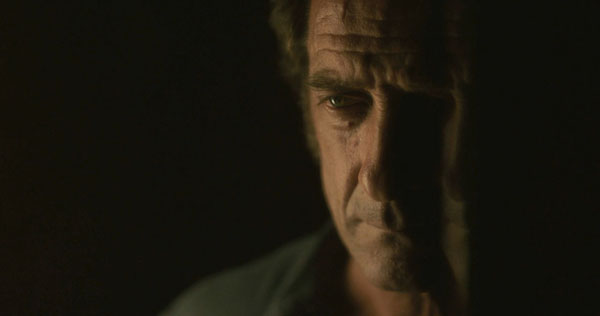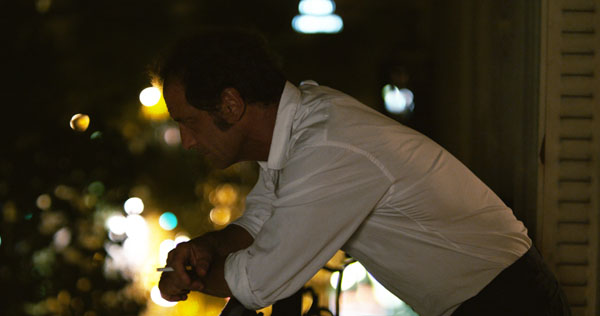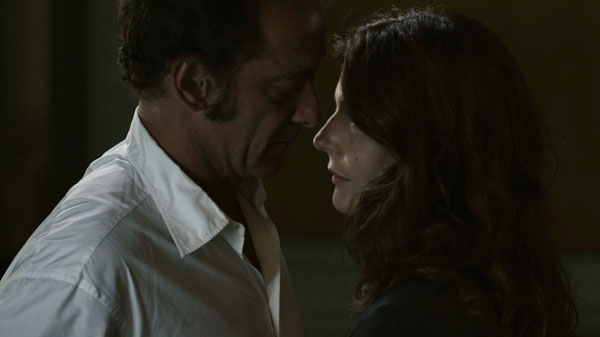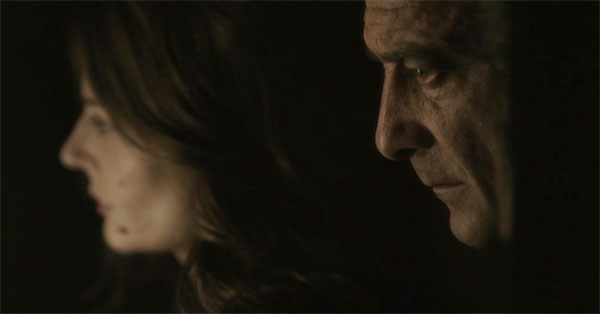“At a packed late-night screening attended by the likes of Catherine Deneuve, Jane Campion, Leos Carax and Kylie Minogue,” writes Keith Uhlich in a dispatch from Cannes back home to Time Out New York, “I found myself drifting dreamily in and out of this bleak tale of a French family undone by the machinations and perversions of a wealthy businessman named Edouard Laporte (Michel Subor). Marco Silvestri (Vincent Lindon) is the ostensible lead, a ship’s captain who abandons his post to seek revenge on Laporte. But good luck figuring that out on a first view: Denis undermines traditional narrative at every turn, preferring elliptical, patience-testing opacity to moment-by-moment decipherabilty.”
“It may not have been selected for the main competition at the 2013 Cannes Film Festival, but that in no way prevents Claire Denis‘s narcotic noir deconstruction, Bastards, from being the best film to play here,” writes David Jenkins at Little White Lies. “Perhaps the unrelenting bleakness of its tone accounts for why Denis has been ignobly busted down to the Un Certain Regard strand for what is undoubtedly a major work, one which easily holds its own among a near-defectless oeuvre which includes such modern greats as The Intruder, Beau Travail and 35 Shots of Rum. Though the title imparts aggression and violence, Bastards is a more intoxicating and sensual work, enveloping its black heart inside a puzzle-box narrative conceit that merrily wrong-foots until the shocking final frames.”
“Denis is one of the most distinctive and challenging voices in contemporary cinema,” grants the Guardian‘s Xan Brooks. “At her worst, her excessive control tips into contrivance. Les Salauds (aka The Bastards) is not Denis at her best. The mood of foreboding is established right away, as 80s electronica squalls on the soundtrack and Lola Creton picks her way, naked, through the dark streets of Paris. The family factory is in crisis, the patriarch is dead and the finger of blame points at Edouard Laporte (Michel Subor), a sulphurous little businessman who resides nearby. But the way ahead is fraught with shadows, secrets and shifting sands. Students of Chekhov should also take note of the gun on the mantelpiece.”
“As the plot progresses, the film plunges depths of perversion, cruelty and trauma that rival the darkest moments of Twin Peaks and Blue Velvet,” writes Brian Clark at Twitch.
“Bastards is an incomprehensible puzzle, written, she admits in the press notes, in a week on a challenge from her sales agent,” notes Barbara Scharres at RogerEbert.com. “Loosely inspired by the William Faulkner novel Sanctuary, Bastards introduces themes of infidelity, suicide, corporate greed, kidnapping, and incest. Almost everything that comprises the story is only hinted at…. It doesn’t add up to much but it is nice to look at. Denis further describes in her press notes that Bastards is her first film shot in a digital format rather than on 35mm film. She describes working with her longtime director of photography Agnès Godard to avoid the worst pitfalls of working in digital: too much light and too great a sharpness in the close-ups. Actually, that makes for a more enlightening story than the one on the screen.”
At the Playlist, Jessica Kiang reports that, in the circles she’s moving in at Cannes, Bastards “has so far not so much divided as cleaved… Fans of her dreamier, long-take, composed photography will be shocked by the choppy, disorienting close-ups we get here, while those expecting any hint of her recurring post-colonialist themes and extraordinary sense of place will be disappointed by a film that eschews all wider politics and geography in favor of an almost generic psycho-sexual thriller plot, which of course ends up anything but generic in Denis’s hands.”
“Had this been directed by a man, it’s not unlikely that charges of misogyny might be hurled at the film,” suggests David Rooney in the Hollywood Reporter. “While Lindon’s compelling performance gives his character psychological gravitas, Marco is drawn as a flawed but noble victim. The women, however, are all weak or calculating. [Chiara] Mastroianni’s role [as Laporte’s mistress] is sorely lacking in nuance; Creton’s character is so thickly cloaked in ambiguity that it muffles any possible core of innocence; and [Julie] Bataille plays Sandra [Marco’s sister] as a self-justifying bitch, exposing her brother to danger while assuming none of the responsibility herself. All that makes this a punishingly dyspeptic drama that offers not a glimmer of redemption.”
“At turns perversely frustrating and completely engaging, Bastards’ composed aesthetic, intense performances and electronic score from Tindersticks is surprisingly seductive, given its subject matter, although its payoff, deliberately with-held to the last frames, is gratuitously over-stated,” finds Screen‘s Fionnuala Halligan.
For Indiewire‘s Eric Kohn, Bastards “creates the sour impression of a half-formed work.” At Cineuropa, Domenico La Porta finds “a dark, unwholesome beauty in [Denis’s] non-Manichean approach to the hero confronted by adversity.”
The festival’s posted a clip (1’13”).
Update: “More than any of Denis’s previous films,” writes Mike D’Angelo at AV Club, Bastards “calls to mind Olivier Assayas’s highly divisive Demonlover, with its sterile conjunction of corporate malfeasance and sexual perversion. And as with Demonlover (which I quite like), formal magnificence obscures content that could kindly be characterized, when viewed head-on, as kinda sorta dumb…. But while Bastards is never less than enthralling while it unravels, its resolution—again, like that of Demonlover—feels shallowly sordid, as if the entire movie was really just a prolonged moralistic scold cleverly disguised as something richer and more mysterious. I suspect it, too, will wind up as an intriguing footnote in its director’s filmography.”
Updates, 5/24: “It is the darkest movie—visually, psychologically and spiritually—that Denis has made,” writes Amy Taubin for Sight & Sound. “It’s also one of the rarest of cinematic objects—a completely contemporary, disturbingly relevant film noir.”
For Wesley Morris, writing at Grantland, “the sex and violence lead dramatically upward, and Denis knows where to put all that strength and silence, usually right into Chiara Mastroianni…. Denis directs with the heat and confidence that give the inherent mounting absurdity of the script some grim wonder.”
Writing for Paste, Tim Grierson suggests “that some of the flashbacks may not be literal but, rather, the imagination of those events by others—and therefore more lurid and surreal as a consequence. Frankly, it’s all in keeping with a movie in which we’re not always sure of what we’re seeing or in whom to trust. Everything in Bastards is viewed through the rotting unhappiness of those in the film, as kinky sex, resentment and bloodshed ooze from its pores.”
“A film of profoundly somber gloam, of loneliness and anger and even stifled madness, of complicity and solitude, its sadness is almost absolute,” writes Notebook editor Daniel Kasman. “It is another small film from Denis, as befits its Paris setting, a retreat from the sprawl of White Material, but brings back from that film the violence and primal darkness of its climatic night, finding it lain across a more modern but everyday world, with terrifying results.”
Update, 5/27: “I haven’t had so many post-screening conversations to nail down the implication of certain shots since Upstream Color,” writes Jordan Hoffman at Film.com. “Unlike Shane Carruth’s pseudo-scientific psychedelic freakout, however, this is ultimately a straight-up tale of vengeance.”
Update, 5/31: “Denis has made that increasingly rare film in which the graphic acts depicted seem more necessary than superfluous,” writes Variety‘s Scott Foundas. And “even at its most opaque, Bastards always exerts a dreamlike pull rooted in Denis’s rhythmic layerings of image, sound and music.”
Cannes 2013 Index. And you can watch over 100 films that have seen their premieres in Cannes right here on Fandor. For news and tips throughout the day every day, follow @KeyframeDaily on Twitter and/or the RSS feed. Get Keyframe Daily in your inbox by signing in at fandor.com/daily.







